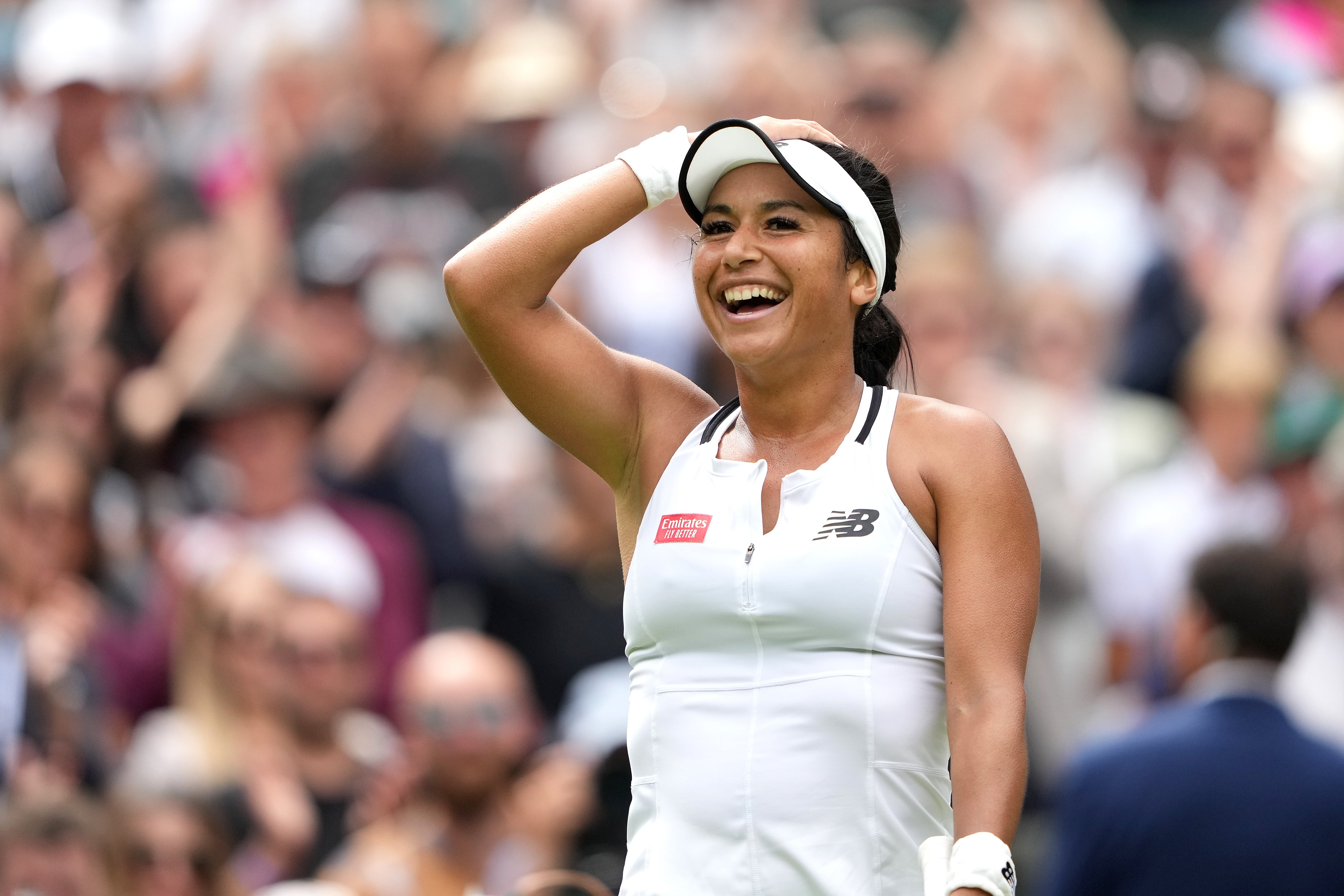Heather Watson: The British tennis star playing the grand slam of her life at Wimbledon
There have been plenty of ups and downs in the Channel Islander’s career, so she is determined to enjoy her run at the All England Club, write Lawrence Ostlere and Chris Stevenson


It took 12 years and 43 attempts, but on Friday Heather Watson finally reached the fourth round of a grand slam.
She would have been forgiven for thinking it would never happen. Watson has been largely treading water since her career-high singles ranking of 38 at the start of 2015 – barring a sole mixed-doubles triumph at Wimbledon in 2016 and another appearance in the final of the same tournament the following year – with a series of gallant defeats and near misses. In six of the past seven years she has won only one grand slam match all season; 26 times in her career she has entered a major and lost in the first round.
She came tantalisingly close in 2015 as she served for her third-round match against Serena Williams at Wimbledon, but fell to defeat, and there was another three-set loss to Victoria Azarenka two years later. Watson has never bemoaned the ups and downs she has faced in her career, but as time marched on her legacy was shaping into one that would be easy to place in that much-used sporting category of “unfulfilled promise”.
That is what makes this week at Wimbledon so special. John McEnroe summed it up for the BBC: “Nearly beating Serena Williams in 2015, to me, was the best she's ever played by far and somehow she didn’t win that. Then there’s a hangover, and then you're at the point where you're sort of in the minor leagues. But to have this chance... think about what she’s been through in the last seven years to get back to this stage. Dreams still come true.”
Watson, 30, had seen her singles ranking slip to 121 in the world before this week, with her doubles ranking sitting slightly higher at 109. Younger players such as the grand slam-winning Emma Raducanu have been in the spotlight during the past 18 months – and Katie Boulter, Harriet Dart and Jodie Burrage all arrived at Wimbledon showing better form on the grass. But it is Watson who is having the tournament to remember.
“What an atmosphere. There is nowhere I would rather make round four,” Watson said after winning the match on Friday. Thanks to two of her matches rolling into a second day, Watson has played every day of Wimbledon so far, with yesterday bringing a second-round women’s doubles match with partner Harriet Dart – the pair ran out winners two sets to love.
Watson celebrated an emotional victory over Tamara Korpatsch in her first-round match on Court One earlier this week, after what she described as a “disaster” on the same court last year as she missed a match point in defeat by Kristie Ahn, who came into the draw via the “lucky loser” route.
“The person I am is a fighter. I’m also the type of player that needs to put in a lot of work to play good tennis, a lot of hours on the court, a lot of hours in the gym,” she said after that first-round win. “Just not being happy with my ranking, the way I’m playing. I expect more of myself. I think tennis players as a whole always do. But I felt like the last few years I’ve been underachieving.
“Coming back, I was so happy I could change the outcome and the narrative this year,” she added.
Watson has always been aware of the time constraints on a professional career in tennis, saying in 2015 when she reached her ranking high: “On the women’s side, players are starting to peak later on, but the average age is about 31, 32 when you finish playing, so I want to make the most of it.” She is now 13 years into her career, and it has been a decade since she first reached the third round of Wimbledon as a 20-year-old in 2012.
It was at that time the public at large would get to know the backstory of Watson – about how her father, Ian, met her mother, Michelle, in Papua New Guinea’s capital Port Moresby while working out there. The pair fell in love and would later move to Guernsey, where Heather was born and raised (and whom she would represent in tennis at the 2010 Commonwealth Games in Delhi).
Watson was athletic as a child and showed promise with tennis. “It felt different from swimming or running because I wasn’t just trying to go faster than everybody else. Tennis felt creative — artistic, even — working out which shot could win you the next point,” Watson would later say. Watson and her family made the decision for her to train at what was then called the Bollettieri Academy in Florida, and she moved out to the US aged 12.
Speaking to The Times in 2018, Watson said of that time: “It’s only now that I realise how much my parents sacrificed for me. They lost their daughter! I was living thousands of miles away. When they had to say goodbye, I saw tears in my dad’s eyes and couldn’t understand why he was so upset – being at the academy was the most wonderful thing to happen to me, so why was he crying?”
In the same interview, her father said: “Over the years, I’ve been asked for advice by parents with children who are interested in sport. It’s difficult to know what to say because what Michelle and I did seemed really... simple. We wanted Heather to be happy, so we tried to identify the things she enjoyed doing. It was obvious she was a natural athlete; that’s where she was happiest.”
And Watson has appeared to try never to let frustrations over her form or bad luck overshadow that. It must have been hard, though. Take the end of 2019 and the start of 2020, for example. Watson had worked her way back to a ranking of 49 in the world and capped off her improved form with a Mexican Open title, her first WTA title in four years and fourth overall. She said after that win: “The last six months have been really good and I’ve started to find myself again, playing some really good tennis. I’m happy with where I’m at now and feeling very optimistic for next year.”
Then came the Covid-19 pandemic and all that entailed.
Off the court, Watson has spoken out on numerous occasions about the abuse she receives on social media, particularly when she loses matches – aimed not at her game, but at her race. “I’ve been called a monkey and told to go back to the zoo. That hurt. It’s just so disappointing and sad. It’s usually when I lose a match and mostly from men who have gambled on me to win. They pick on my race.”
Watson, an Olympian for Team GB at three games – London in 2012, Rio in 2016 and Tokyo most recently – has always tried to set a good example for those who watch her play and she will surely enjoy however long is left of her Wimbledon run. Her next opponent will be the unseeded Jule Niemeier of Germany, ranked 97 in the world, a match-up that offers a real chance for her to progress further. However, Watson will be trying to take it in her stride.
“As I've got older, I feel my highs aren’t as high but my lows aren’t as low,” she said this week. “I’m more level-headed. Making my first third round, I was on top of the world. But I think it’s better being how I am now.”






Join our commenting forum
Join thought-provoking conversations, follow other Independent readers and see their replies
Comments